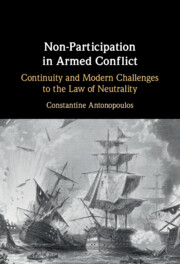Book contents
- Non-Participation in Armed Conflict
- Non-Participation in Armed Conflict
- Copyright page
- Dedication
- Contents
- Acknowledgements
- Table of Cases
- Table of Treaties
- Table of Documents
- Abbreviations
- Introduction
- 1 Is the Law of Neutrality Obsolete?
- 2 The United Nations’ Collective Security System and Neutrality
- 3 Rights and Duties under the Law of Neutrality
- 4 Neutrality and the Use of Force
- 5 Neutrality and Non-international Armed Conflict
- 6 Neutrality and Cyber Warfare
- 7 Conclusions
- Bibliography
- Index
1 - Is the Law of Neutrality Obsolete?
Published online by Cambridge University Press: 24 February 2022
- Non-Participation in Armed Conflict
- Non-Participation in Armed Conflict
- Copyright page
- Dedication
- Contents
- Acknowledgements
- Table of Cases
- Table of Treaties
- Table of Documents
- Abbreviations
- Introduction
- 1 Is the Law of Neutrality Obsolete?
- 2 The United Nations’ Collective Security System and Neutrality
- 3 Rights and Duties under the Law of Neutrality
- 4 Neutrality and the Use of Force
- 5 Neutrality and Non-international Armed Conflict
- 6 Neutrality and Cyber Warfare
- 7 Conclusions
- Bibliography
- Index
Summary
The law of neutrality is not obsolete. Its validity subsists despite the prohibition of the use of force,the advent of collective security and the violations of the rights of neutrals during the two world wars. The sources of the law are customary laws and treaties. Customary law of neutrality is based on State practice mainly in the form of national military manuals. It is applicable in the event of an international armed conflict irrespective of the existence of a formal state of war and irrespective of the scale and extent of th conflict. Neutrality has withstood the challenge of collective security and the prohibition of the use of force both in the interwar years and after World War II. The gross violations of the rights of neutrals during World Wars I and II have been justified as reprisals or countermeasures; this is a further confirmation that beligerent practice at the time constituted a deviation from the law rather than a change or demise of the law of neutrality.
- Type
- Chapter
- Information
- Non-Participation in Armed ConflictContinuity and Modern Challenges to the Law of Neutrality, pp. 8 - 57Publisher: Cambridge University PressPrint publication year: 2022

